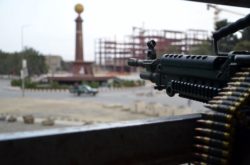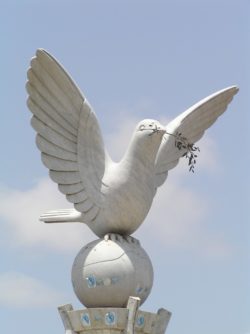Mass Atrocity Prevention, Protection and Peace
The Mass Atrocity Prevention, Protection and Peace research theme includes our ongoing work on Peace and Conflict, and continues the work of the European Centre for the Responsibility to Protect (ECR2P). Our research on armed conflict and peace explores the underlying sources and nature of organised violence, its societal and human impact, and strategies and practices aimed at preventing armed conflict and building peace. We have a particular interest in civil wars and other forms of intrastate armed conflict as a pressing global security challenge, understood from a political and social context. On this basis, we aim to make an impact upon policy debates related to stabilisation, human protection and peace.
POLIS has a long history of studying warfare and conflict dynamics through the International Relations group and research on the English School. CGSC have recently bolstered our conflict research with the appointments of Drs Helena Hinkkainen and Alex Waterman. Professor Adrian Gallagher leads this research theme.
Conflict drivers and the causes of war
 We research the underlying driving forces of conflict which make societies more vulnerable to instability and violence. Demographic pressures, socio-economic inequality, ecological stresses, and migration – including accelerating rural to urban migration – are all associated, separately or in conjunction with each other, with conflict proneness. At the same time, some communities – both nationally and locally – experience multiple conflict drivers without experiencing significant armed conflict, which raises questions as to why and how some societies are more resilient than others. Research related to conflict drivers is informed by the concept of ‘simultaneous, mutually compounding societal stresses’, combining the impact of environmental, social and political factors. In this context riots and protests over rising prices and scarcities – for example in food or domestic fuel – can be a significant indicator of political conflict and potential upheaval.
We research the underlying driving forces of conflict which make societies more vulnerable to instability and violence. Demographic pressures, socio-economic inequality, ecological stresses, and migration – including accelerating rural to urban migration – are all associated, separately or in conjunction with each other, with conflict proneness. At the same time, some communities – both nationally and locally – experience multiple conflict drivers without experiencing significant armed conflict, which raises questions as to why and how some societies are more resilient than others. Research related to conflict drivers is informed by the concept of ‘simultaneous, mutually compounding societal stresses’, combining the impact of environmental, social and political factors. In this context riots and protests over rising prices and scarcities – for example in food or domestic fuel – can be a significant indicator of political conflict and potential upheaval.
Highlight: Dr Helena Hikkainen's ESRC-funded research (with Professor Gallagher) explores and explains non-state armed groups' perpetration of mass atrocity crimes. Complementing advanced quantitative analysis from CGSC, this project dovetails with research and policy networks in ECR2P. The research is developing the first dataset in the world that collects systematic evidence on non-state armed groups perpetrating mass atrocities such as genocide to enable new and policy relevant understanding of the correlates of non-state mass atrocities. Six countries - the Central African Republic, the Democratic Republic of Congo, Iraq, Nigeria, Syria and Somalia - are included in the dataset. The findings will impact a range of stakeholders and policy makers such as the United Nations Office on the Prevention of Genocide and the European External Action Service's EU toolkit on mass atrocity prevention.
Highlight: Prof Newman's research is well known in the IR and Security literature for its contributions to studies of conflict and civil war. One prominent example of this is his work on 'new wars', drawing on and furthering Mary Kaldor's thesis. Prof Newman's article in Security Dialogue draws out the common features of contemporary civil war.
Insurgency and counter-insurgency
 Research in this area focuses on insurgency, counter-insurgency and rebel governance. This concerns questions related to why and how non-state military groups form, grow and recruit combatants, how they control and administer territory, and how they seek to win the support of local populations whilst simultaneously engage in armed conflict against state actors. Understanding why and how rebel groups gain legitimacy – through the provision of ‘public goods’, security, and by defending the ‘interests’ of their supporters – provides important lessons which can inform counterinsurgency and peacebuilding policies.
Research in this area focuses on insurgency, counter-insurgency and rebel governance. This concerns questions related to why and how non-state military groups form, grow and recruit combatants, how they control and administer territory, and how they seek to win the support of local populations whilst simultaneously engage in armed conflict against state actors. Understanding why and how rebel groups gain legitimacy – through the provision of ‘public goods’, security, and by defending the ‘interests’ of their supporters – provides important lessons which can inform counterinsurgency and peacebuilding policies.
Highlight: Dr Worrall's Gerda Henkel-funded research explores how militias and rebel groups are understood in counterinsurgency doctrines. The project analyses the factors that shape whether and how militias and rebel groups are integrated into these doctrines across a range of Western and non-Western case studies.
Peacebuilding
 We respond to the global security challenge of preventing armed conflict and building peace. Research on the underlying sources of societal violence raises a number of implications for long term conflict prevention and is relevant to international policy initiatives such as the World Bank ‘Fragility, Conflict, and Violence agenda 2020-2025’, the UK Government’s ‘Approach to Stabilisation’ agenda, and the 2030 Agenda for Sustainable Development.In particular, research in this area is relevant to Sustainable Development Goal 16: The promotion of peaceful and inclusive societies for sustainable development, providing access to justice for all, and effective, accountable and inclusive institutions at all levels.
We respond to the global security challenge of preventing armed conflict and building peace. Research on the underlying sources of societal violence raises a number of implications for long term conflict prevention and is relevant to international policy initiatives such as the World Bank ‘Fragility, Conflict, and Violence agenda 2020-2025’, the UK Government’s ‘Approach to Stabilisation’ agenda, and the 2030 Agenda for Sustainable Development.In particular, research in this area is relevant to Sustainable Development Goal 16: The promotion of peaceful and inclusive societies for sustainable development, providing access to justice for all, and effective, accountable and inclusive institutions at all levels.
Highlight: Dr Hinkkainen's Swedish Research Council-funded research explores why some civil wars and terrorist campaigns are more devastating than others. The project develops a new theory on so-called secondary mobilization, motivated by a different logic to the original rebellion (and therefore requiring different peace building approaches to remedy). We combine insights from reputational learning and social mobilization to explain how fear of future attacks shapes the formation of communities at risk for forming militias and driving individual’s decisions to mobilize for violence, or not.
